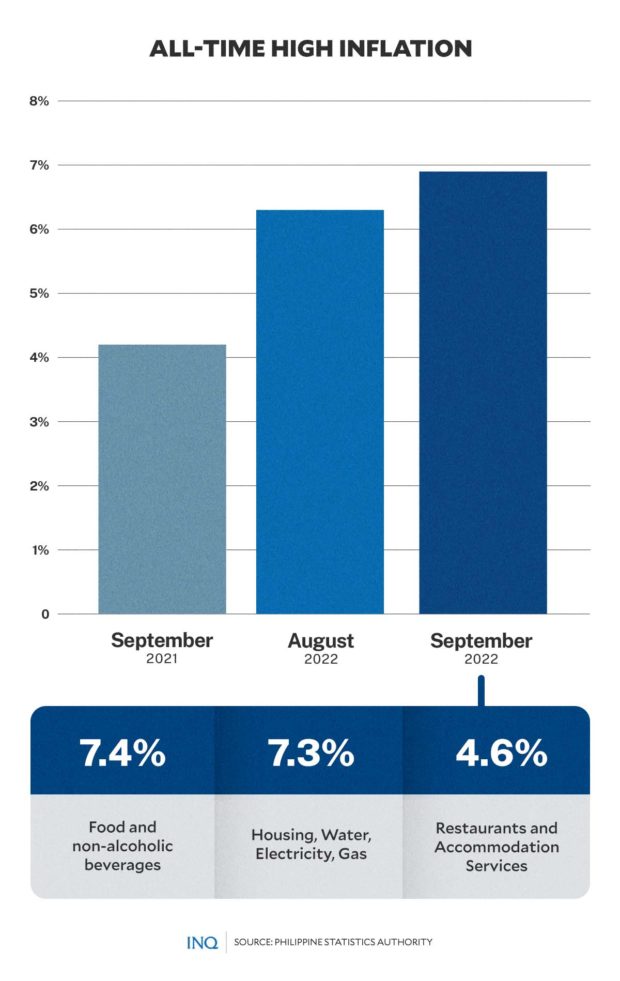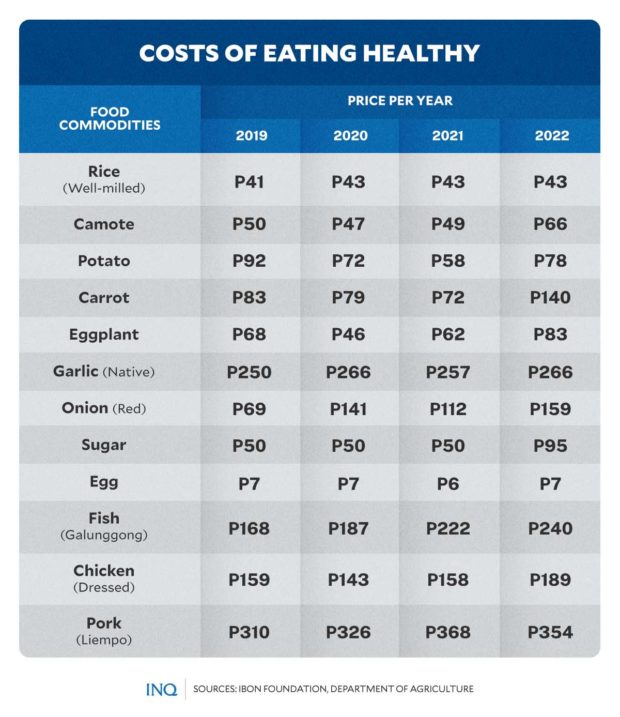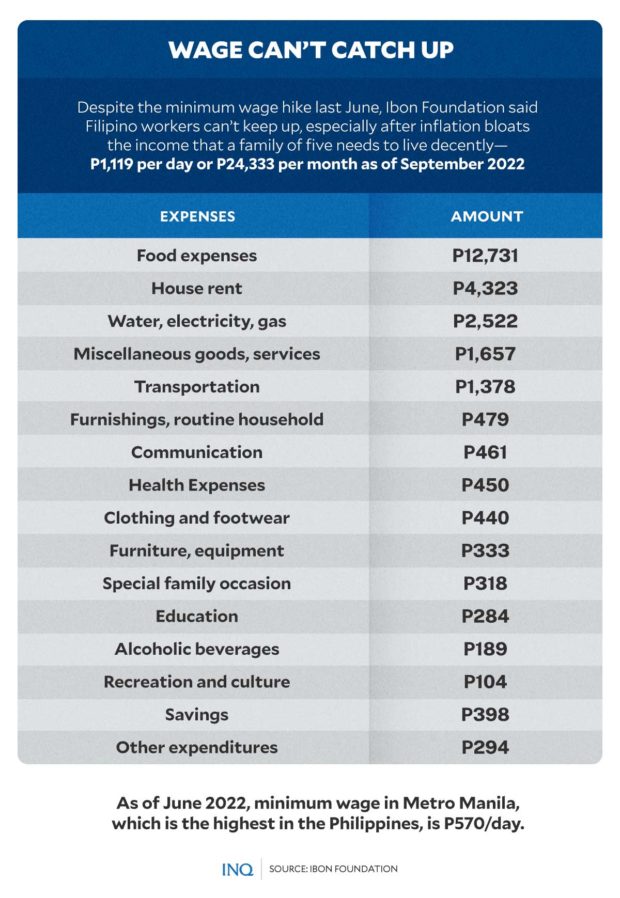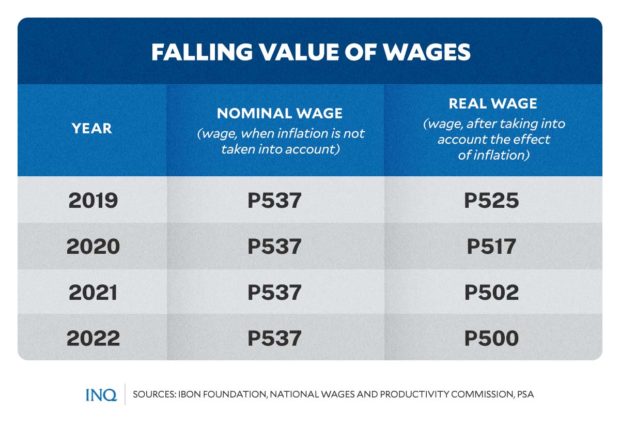Inflation impact: Meager June wage hike meaningless
MANILA, Philippines—Wage increases in most regions, including Metro Manila, finally took effect last June, but a local think tank said Filipino workers are still having a tough time keeping up.
But why?
As listed by the National Wages and Productivity Commission (NWPC), the minimum wage in Metro Manila, which is the highest in the Philippines, is now P570, a P33 increase from the previous P537.
The regions with the next highest minimum wage are Calabarzon (P470), Central Luzon (P460), Western Visayas (P450), Davao Region (P443), Central Visayas (P435), and Northern Mindanao (P405).
Last June, Silvestre Bello III, who was still leading the Department of Labor and Employment then, said minimum wage earners, including domestic workers, will benefit from the series of wage hikes.
But with inflation hitting an all-time high of 6.9 percent last month, Ibon Foundation said real wages for millions of Filipinos, which is the pay a person can expect to receive once inflation is taken into account, are falling.
READ: September inflation revs up to 6.9%
As stressed by the Philippine Statistics Authority (PSA), the latest readout was because of the faster rate of increases in food and non-alcoholic beverages (7.4 percent); housing, electricity and gas (7.3 percent); and restaurants and accommodation services (4.6 percent).
Inflation last month accelerated from 6.3 percent in August. The PSA said this is the highest recorded readout since October 2018, when inflation hit 6.7 percent because of a spike in the price of rice.
It said the share of food and non-alcoholic beverages in the latest increase was 70.6 percent, while housing, electricity and gas, and restaurants and accommodation services had a share of 18.2 percent and 6.5 percent, respectively.
Because of high inflation, Ibon Foundation stressed that the real wage in Metro Manila has fallen to P500, which is way below P525 in 2019, P517 in 2020, and P502 in 2021.
Becoming out of reach
The local think tank previously explained that when inflation drives the real value of wages to all-time lows, basic food and transportation services are expected to be almost out of reach, especially for the poor.
Based on data from the Department of Agriculture, well-milled rice is now worth P43 a kilo, higher than P41 in 2019, while native garlic and red onion now cost P266 and P159 a kilo, higher than P250 and P69 a kilo in 2019.
A kilo of eggplant is now P83, more expensive compared to P68 in 2019. Camote, potato, and carrot are now worth P66, P78, and P140 a kilo, while refined sugar and egg now cost P95 and P7.
The price of galunggong likewise spiked to P240 from P168 a kilo in 2019, while dressed chicken and pork liempo are now worth P189 and P354 a kilo, Ibon Foundation said.
To control inflation, the National Economic and Development Authority (NEDA) advised consumers not to buy excessively, especially since inflation is expected to remain elevated throughout the rest of the year.
Socioeconomic Planning Undersecretary Rosemarie Edillon told dzBB TV that consumers can control the acceleration of the readout, stressing that “inflation means the demand is high, but there are fewer products being purchased.”
Edillon stressed that on the demand side, consumers should lessen excessive purchasing, while production is being increased. She said the spike in prices is driven by external reasons that are “out of our control.”
But Sonny Africa, executive director of Ibon Foundation, asserted that there is really something wrong when over three to four million Filipino families living hand to mouth are among those being told by the government to spend less.
He said, the statement of NEDA likewise confirmed why economic managers won’t give ayuda—”for them, this (ayuda) is just needless inflationary pressure.”
Living wage
Ibon Foundation said the recent oil price hikes contributed to the soaring prices of basic goods and services. As a result, Filipino workers are still struggling to make ends meet even with the hike in minimum wage last June.
RELATED STORY: As Bongbong Marcos prepares to govern, calls for ‘living wage’ grow louder
It stressed that in Metro Manila, the P570 minimum wage is barely half, or 51 percent, of the P1,119 estimated living wage needed by a family of five to live decently as of last month.
This indicates that the P570 minimum wage in the region is not enough to meet the needs for a decent living in the region, which requires P1,119 a day or P24,333 a month, the local think tank said.
Based on its computation, Ibon Foundation said out of the P24,333, P12,731 is for food expenses; P4,323 is for house rent; P2,522 is for water, electricity and gas; P1,657 is for miscellaneous goods, services; and P1,378 is for transportation.
The remaining amount was broken down to P479 for furnishings, routine household; P461 for communication; P450 for health expenses; P440 for clothing and footwear; P333 for furniture and equipment; P318 for special family occasion; P284 for education; P189 for alcoholic beverages; P104 for recreation and culture; P398 for savings; and P294 for other expenses.
This, while rising joblessness and falling incomes have increased the number of families without savings since the start of the year—increasing by a million to reach 19.4 million as of this year’s third quarter.
RELATED STORY: Tougher days ahead: Household income, spending falling
Inflation a top concern
Based on a latest Pulse Asia survey, which was conducted from Sept. 17 to 21, controlling inflation is still the top concern of most Filipinos, with 66 percent of 1,200 respondents saying that inflation is the biggest problem that should be addressed.
Out of the 66 percent, 51 percent were from class ABC, 71 percent were from class D, and 58 were from class E. Likewise, 68 percent were from Metro Manila, 56 percent were from Balance Luzon, 71 percent were from Visayas, and 81 percent were from Mindanao.
“This is the prevailing view in all geographic areas and socio-economic classes (56 percent to 81 percent and 51 percent to 71 percent, respectively),” Pulse Asia said.
As revealed in the result of the same survey, the administration of Ferdinand Marcos Jr. received high approval ratings for its handling of key national concerns, except for its response to inflation.
Out of 13 issues, Pulse Asia said most Filipinos viewed issues related to the economy as top concerns—controlling inflation (66 percent), increasing the pay of workers (44 percent), creation of jobs (35 percent), and poverty reduction (34 percent).
It stressed that with regard to controlling inflation, which is the top concern of over half of Filipinos—66 percent—the administration of Marcos got a minus 11 percent net approval rating.
Given the soaring prices of basic goods and services and falling real value of wages, the head of the House Committee on Labor and Employment vowed to discuss the call for higher wages soon.
Last month, the progressive Makabayan bloc filed a bill that seeks to set a “living” minimum wage for workers, stressing that regional wages are “irrational.”
“It shall be of such amount which is sufficient for a worker to provide his/her family the basic and necessary expenditures that take into consideration all of his/her family’s physiological, social and other needs, so as to enable them to live and maintain a decent standard of living beyond mere subsistence, with adequate allowance for social security,” House Bill No. 4898 read.
RELATED STORY: PH economy in Marcos’ 1st 100 days: The perils of old thinking
TSB



















